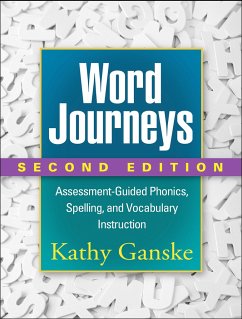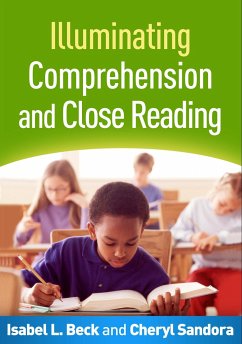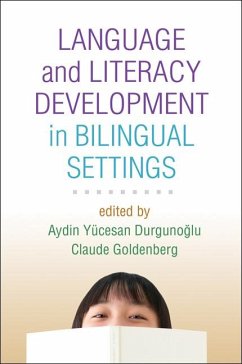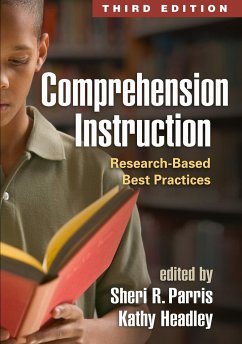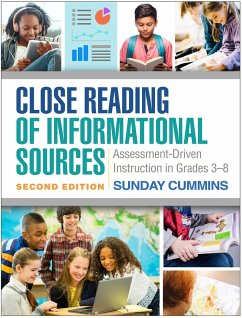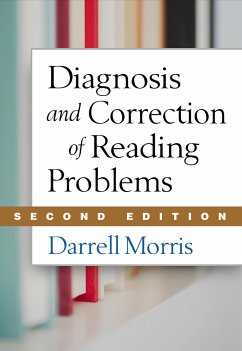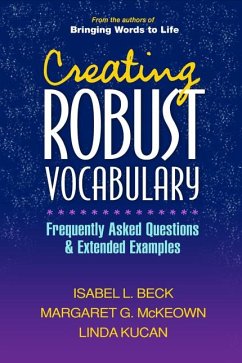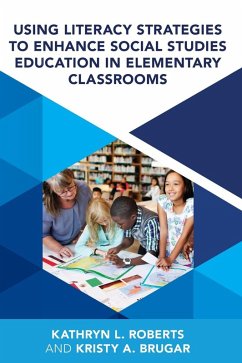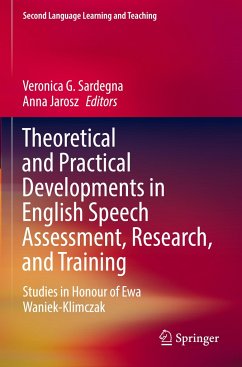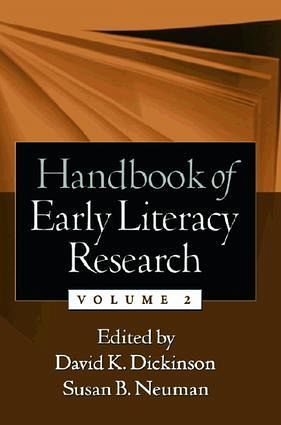
Handbook of Early Literacy Research, Volume 2
Volume 2
Herausgeber: Dickinson, David K; Neuman, Susan B
Versandkostenfrei!
Versandfertig in über 4 Wochen
93,99 €
inkl. MwSt.

PAYBACK Punkte
47 °P sammeln!
Table of contents:‘Dickinson, Neuman,’ Introduction. Part I: Cognitive and Linguistic Building Blocks of Early Literacy Development. ‘Dickinson, McCabe, Essex,’ A Window of Opportunity We Must Open to All: The Case for Preschool With High-Quality Support for Language and Literacy. ‘Neuman,’ The Knowledge Gap: Implications for Early Education. ‘Biemiller,’ Vocabulary Development and Instruction: A Prerequisite for School Learning. ‘Ashby, Rayner,’ Literacy Development: Insights from Research on Skilled Reading. ‘Pugh, Sandak, Frost, Moore, Mencl,’ Neurobiological Investi...
Table of contents:
‘Dickinson, Neuman,’ Introduction. Part I: Cognitive and Linguistic Building Blocks of Early Literacy Development. ‘Dickinson, McCabe, Essex,’ A Window of Opportunity We Must Open to All: The Case for Preschool With High-Quality Support for Language and Literacy. ‘Neuman,’ The Knowledge Gap: Implications for Early Education. ‘Biemiller,’ Vocabulary Development and Instruction: A Prerequisite for School Learning. ‘Ashby, Rayner,’ Literacy Development: Insights from Research on Skilled Reading. ‘Pugh, Sandak, Frost, Moore, Mencl,’ Neurobiological Investigations of Skilled and Impaired Reading, II. Phonemic Awareness and Letter Knowledge. ‘Lonigan,’ Conceptualizing Phonological Processing Skills in Prereaders. ‘Burgess, ‘The Development of Phonological Sensitivity. ‘Phillips, Torgesen,’ Phonemic Awareness and Reading: Beyond the Growth of Initial Reading Accuracy. ‘Ehri, Roberts,’ The Roots of Learning to Read and Write: Acquisition of Letters and Phonemic Awareness. Part III: Families and Relationships: Socioemotional and Linguistic Supports. ‘Landry, Smith,’ The Influence of Parenting on Emerging Literacy Skills. ‘Pianta,’ TeacherChild Relationships in Early Literacy. ‘Hoff,’ Environmental Supports for Language Acquisition. ‘Snchal, Ouellette, Rodney,’ The Misunderstood Giant: On the Predictive Role of Early Vocabulary to Future Reading. Part IV: Cultural and Linguistic Diversity. ‘Vaughn, Linan-Thompson, Pollard-Durodola, Mathes, Crdenas-Hagan,’ Effective Interventions for English Language Learners (Spanish/English) at Risk for Reading Difficulties. ‘Craig, Washington,’ Recent Research on the Language and Literacy Skills of African American Students in the Early Years. ‘Leseman, van Tuijl, ‘Cultural Diversity in Early Literacy: Findings in Dutch Studies. ‘McNaughton,’ Considering Culture in Research-Based Interventions to Support Early Literacy. Part V: Supporting Literacy in Preschool Classrooms. ‘Bodrova, Leong,’ Vygotskian Perspectives on Teaching and Learning Early Literacy. ‘Farran, Aydogan, Kang, Lipsey,’ Preschool Classroom Environments and the Quantity and Quality of Children's Literacy and Language Behaviors. ‘Morrow, Schickedanz,’ The Relationships between Sociodramatic Play and Literacy Development. ‘Beck, McKeown,’ Encouraging Young Children's Language Interactions with Stories. ‘Roskos, Vukelich,’ Early Literacy Policy and Pedagogy. Part VI: Programmatic Interventions During the Preschool Years. ‘Britto, Fuligni, Brooks-Gunn,’ Reading Ahead?: Effective Interventions for Young Children's Early Literacy Development. ‘Needlman, Klass, Zuckerman,’ A Pediatric Approach to Early Literacy. ‘Zill, Resnick,’ Emergent Literacy of Low Income Children in Head Start: Relationships with Child and Family Characteristics, Program Factors, and Classroom Quality. Part VII: Toward Effective Primary Grade Instruction. ‘Morrison, Connor, Bachman,’ The Transition to School. ‘Hiebert, Mesmer,’ Perspectives on the Difficulty of Beginning Reading Texts. ‘Juel,’ The Impact of Early School Experiences on Initial Reading. ‘Salinger,’ Policy Decisions in Early Literacy Assessment. ‘Landesman Ramey, C.T. Ramey,’ Early Education Interventions: Principles of Effective and Sustained Benefits from Targeted Early Education Programs.
Important discoveries in research increasingly highlight the role of early literacy in young children's development - and facilitate the growth of practices and policies that promote success among diverse learners. The Handbook of Early Literacy Research presents cutting-edge knowledge on all aspects of literacy learning in the preschool years. Volume 2 provides additional perspectives on important topics covered in Volume 1 and addresses critical new topics: the transition to school, the teacher-child relationship, sociodramatic play, vocabulary development, neural imaging work, Vygotskian theory, findings from international studies, and more.
Important discoveries in research increasingly highlight the role of early literacy in young children's developmentand facilitate the growth of practices and policies that promote success among diverse learners.
‘Dickinson, Neuman,’ Introduction. Part I: Cognitive and Linguistic Building Blocks of Early Literacy Development. ‘Dickinson, McCabe, Essex,’ A Window of Opportunity We Must Open to All: The Case for Preschool With High-Quality Support for Language and Literacy. ‘Neuman,’ The Knowledge Gap: Implications for Early Education. ‘Biemiller,’ Vocabulary Development and Instruction: A Prerequisite for School Learning. ‘Ashby, Rayner,’ Literacy Development: Insights from Research on Skilled Reading. ‘Pugh, Sandak, Frost, Moore, Mencl,’ Neurobiological Investigations of Skilled and Impaired Reading, II. Phonemic Awareness and Letter Knowledge. ‘Lonigan,’ Conceptualizing Phonological Processing Skills in Prereaders. ‘Burgess, ‘The Development of Phonological Sensitivity. ‘Phillips, Torgesen,’ Phonemic Awareness and Reading: Beyond the Growth of Initial Reading Accuracy. ‘Ehri, Roberts,’ The Roots of Learning to Read and Write: Acquisition of Letters and Phonemic Awareness. Part III: Families and Relationships: Socioemotional and Linguistic Supports. ‘Landry, Smith,’ The Influence of Parenting on Emerging Literacy Skills. ‘Pianta,’ TeacherChild Relationships in Early Literacy. ‘Hoff,’ Environmental Supports for Language Acquisition. ‘Snchal, Ouellette, Rodney,’ The Misunderstood Giant: On the Predictive Role of Early Vocabulary to Future Reading. Part IV: Cultural and Linguistic Diversity. ‘Vaughn, Linan-Thompson, Pollard-Durodola, Mathes, Crdenas-Hagan,’ Effective Interventions for English Language Learners (Spanish/English) at Risk for Reading Difficulties. ‘Craig, Washington,’ Recent Research on the Language and Literacy Skills of African American Students in the Early Years. ‘Leseman, van Tuijl, ‘Cultural Diversity in Early Literacy: Findings in Dutch Studies. ‘McNaughton,’ Considering Culture in Research-Based Interventions to Support Early Literacy. Part V: Supporting Literacy in Preschool Classrooms. ‘Bodrova, Leong,’ Vygotskian Perspectives on Teaching and Learning Early Literacy. ‘Farran, Aydogan, Kang, Lipsey,’ Preschool Classroom Environments and the Quantity and Quality of Children's Literacy and Language Behaviors. ‘Morrow, Schickedanz,’ The Relationships between Sociodramatic Play and Literacy Development. ‘Beck, McKeown,’ Encouraging Young Children's Language Interactions with Stories. ‘Roskos, Vukelich,’ Early Literacy Policy and Pedagogy. Part VI: Programmatic Interventions During the Preschool Years. ‘Britto, Fuligni, Brooks-Gunn,’ Reading Ahead?: Effective Interventions for Young Children's Early Literacy Development. ‘Needlman, Klass, Zuckerman,’ A Pediatric Approach to Early Literacy. ‘Zill, Resnick,’ Emergent Literacy of Low Income Children in Head Start: Relationships with Child and Family Characteristics, Program Factors, and Classroom Quality. Part VII: Toward Effective Primary Grade Instruction. ‘Morrison, Connor, Bachman,’ The Transition to School. ‘Hiebert, Mesmer,’ Perspectives on the Difficulty of Beginning Reading Texts. ‘Juel,’ The Impact of Early School Experiences on Initial Reading. ‘Salinger,’ Policy Decisions in Early Literacy Assessment. ‘Landesman Ramey, C.T. Ramey,’ Early Education Interventions: Principles of Effective and Sustained Benefits from Targeted Early Education Programs.
Important discoveries in research increasingly highlight the role of early literacy in young children's development - and facilitate the growth of practices and policies that promote success among diverse learners. The Handbook of Early Literacy Research presents cutting-edge knowledge on all aspects of literacy learning in the preschool years. Volume 2 provides additional perspectives on important topics covered in Volume 1 and addresses critical new topics: the transition to school, the teacher-child relationship, sociodramatic play, vocabulary development, neural imaging work, Vygotskian theory, findings from international studies, and more.
Important discoveries in research increasingly highlight the role of early literacy in young children's developmentand facilitate the growth of practices and policies that promote success among diverse learners.




